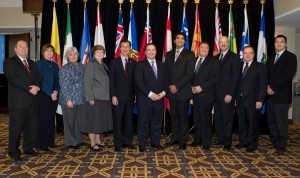
Provincial immigration ministers met over two days in Toronto last week to discuss details of the new Expression of Interest (EOI) immigration system (Citizenship and Immigration Canada)
Canada’s federal, provincial and territorial (FPT) governments concluded two days of meetings on Friday with an agreement on the future of Canada’s immigration system which will give the provinces a central role in immigrant selection.
On the agenda for the FPT immigration ministers were the details of the upcoming Expression of Interest (EOI) model for the Federal Skilled Worker (FSW) program, which Citizenship and Immigration Canada (CIC) is planning to implement by the end of 2014.
The EOI model is an immigrant selection process which requires those seeking to immigrate to first file a simplified application, or “Expression of Interest”, with immigration authorities.
From that pool of applicants, the most promising candidates, based on the immigration department’s selection criteria, are then selected, and invited to submit a full application with includes documentation to prove their claimed qualifications.
The EOI model was first adopted by New Zealand and then more recently by Australia. CIC believes it holds the promise of eliminating the application back-logs that have plagued Canada’s immigration department over the last decade while admitting immigrants with the language, education, age and skill profiles needed to be successful in the Canadian labour market.
The FPT meeting, which was attended by all provincial and territorial immigration minister with the exception of the immigration minister of Quebec, gave unanimous approval for an EOI model for Canada in which provinces and employers select the most promising candidates from the list of EOI applicants, who are then selected to be among the limited number of applicants to be invited to submit a full application.
Co-Chairing the FPT Meeting was Alberta Minister of Enterprise and Advanced Education, Stephen Khan, who voiced the provincial ministers’ support for the plan:
“On behalf of the provinces and territories, we look forward to continuing our work with the Government of Canada to transform the immigration system, making it faster and more responsive to provincial/territorial needs.”
